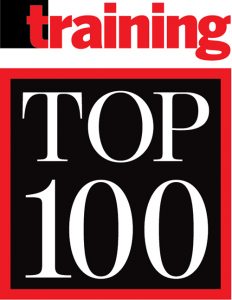
Paycor’s continued focus on new bookings and increased revenue drove Learning & Performance (L&P) to continue to improve a sustainable onboarding program for its field sellers. The business services company initiated its Ascent Sales Onboarding program in fiscal year 2018; in fiscal year 2020, Paycor hired 264 new Sales & Marketing associates.
Program Details
The eight-week program consists of 140 hours of facilitation; 11 hours of e-learning; 163 hours of learner experiences; and an organized repository of processes, data, and reflections for ongoing use. Beginning in March 2020, the program was adapted for the virtual environment. The program components include:
- Week 1: Territory planning with live Salesforce data. Sellers must be familiar with their territory to plan and perform efficiently.
- Week 2: Opportunity creation during which sellers act on the territory planning from Week 1. They begin building their pipeline, learn the different lead sources, and execute the sales process using data from Week 1 to make their first prospecting calls.
- Week 3: Product knowledge is incorporated after sellers have initial interactions with prospects. Here, they learn how to communicate the value of Paycor’s products.
- Week 4: The sales process is reviewed in its entirety through a case study of a Paycor seller and one of their clients. Sellers participate in Demofest, giving them a safe environment to practice the product demonstration skills learned in Week 3.
- Weeks 5-7: Field application is driven as sellers execute on prospective meetings and the pipeline built in the first four weeks.
- Week 8: The Capstone pulls everything together, as sellers present a product demo and executive summary to sales leaders and L&P.
Leveraging the technologies (i.e., Salesforce) used to collaborate within the sales organization is imperative in creating strong habits from the beginning. Additionally, usage of these tools and collaboration with others in the business contributes to the learner’s badge score. The Weekly Dashboard competition is based on data inputs into the learning management system (LMS) (knowledge and experience badges) and Salesforce (activity and achievement badges), creating rigor and transparency.
The 163 learner experiences help the seller create a sales pipeline throughout the program. Sellers access real-time data in Salesforce for applicability and habit-building. For example, sellers facilitate their product demonstration in Week 4’s Demofest with data from one of their current prospects, allowing them to practice and familiarize themselves with the data. The Capstone in Week 8 gives sellers practice presenting a real demo and executive summary that they will be presenting to a prospect. Sellers receive feedback on their presentation from sales leaders and then take that feedback to the actual client meeting.
While Ascent Sales Onboarding helps learners practice for client meetings, it also outlines the performance requirements new hires should complete at each step of the journey—including prospecting, drops, first-time appointments, bank and broker meetings, and pipeline volume. Each week, learners are given clear expectations on the number of drops, prospecting calls, first-time appointments, or other sales activity they need to complete, in coordination with what they learned that week. By identifying competencies and expectations, and incorporating clear reports and visible metrics, both managers and new hires are able to assess performance within the first months.
Throughout Ascent, associates utilize a comprehensive OneNote to take notes and complete activities, giving them a repository of processes, data, and reflections to review at any time. After the eight-week program, associates begin Beyond the Ascent, or continuation training, for months 3-12.
Pre-pandemic, the chief revenue officer (CRO) kicked off Ascent for each cohort with a breakfast to welcome new hires to Paycor, introduce the program, set expectations, and answer questions. Once the pandemic hit, the CRO began holding a virtual welcome meeting.
Results
L&P knows that onboarding affects whether an associate will stay or leave the company within the first year. In fiscal year 2020, terminations (outside of COVID-related headcount reductions) for Sales & Marketing associates with less than one year of tenure only increased by 6.6 percent, even though hiring increased by 36.8 percent. This indicates that while more associates were being onboarded, a smaller percentage of those associates were leaving.
Furthermore, almost half of the Sales & Marketing team had less than one year of tenure in fiscal year 2020, but Paycor’s sales organization increased fiscal year bookings by 5.6 percent, even in the midst of the pandemic.



